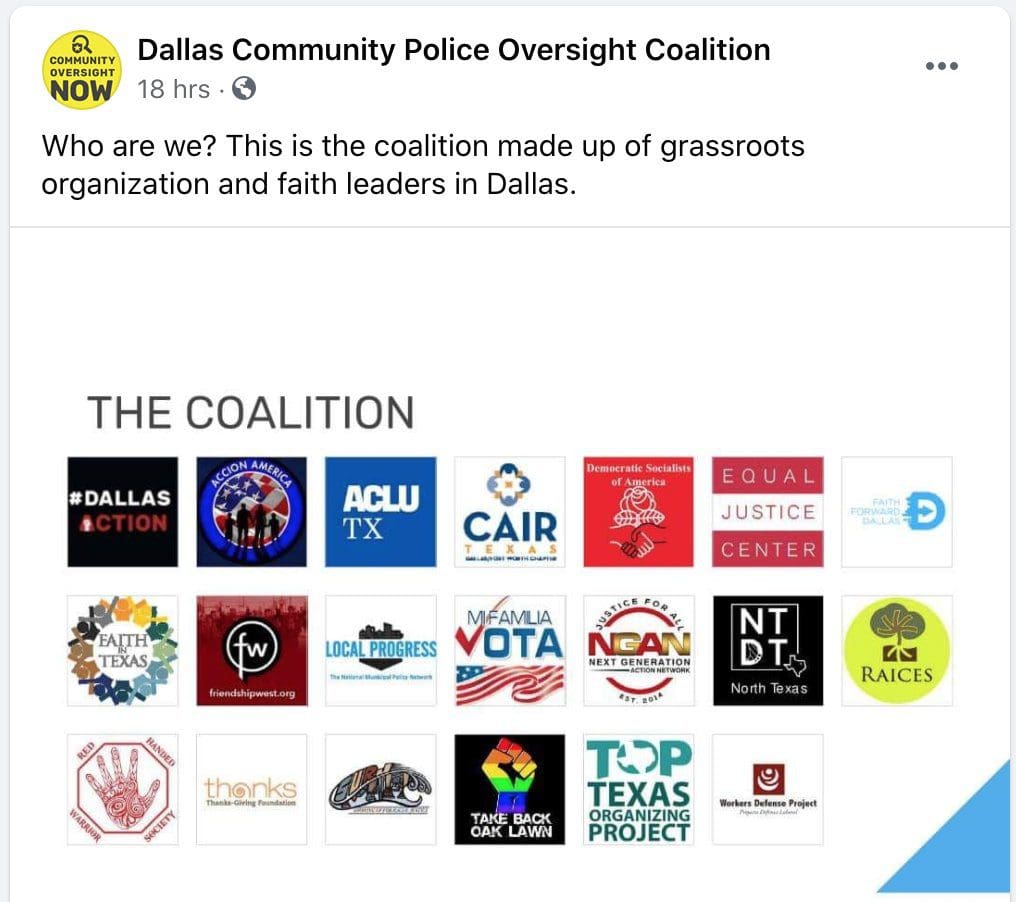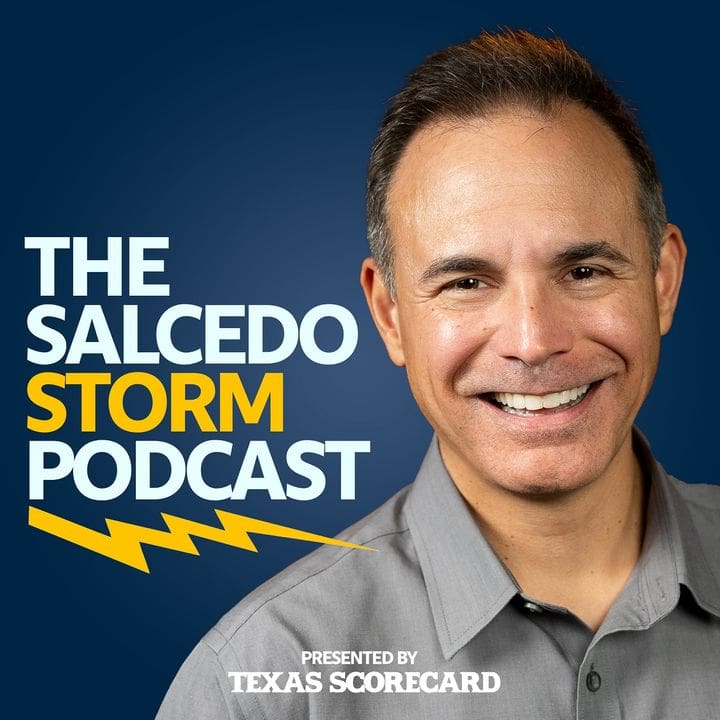In a reversal from claims made to the Texas Legislature in last year’s opposition to property tax reform, Dallas’ city council is saying they can make cuts to the police and still deliver public safety. With average homeowners’ tax bills from the city over 56 percent higher from 2013, there’s no talk of delivering this saved money back to those hurting from the government-mandated economic shutdown, and real police reform in the wake of George Floyd’s death has fallen by the wayside.
At the end of May, anti-police protests organized by a leftist coalition turned into riots in the City of Dallas after the tragic death of George Floyd at the hands of then-Minneapolis police officer Derek Chauvin.
This is the same coalition that pressured the Dallas City Council to pass controversial reforms for an already ineffective police review board.

Last week, the coalition submitted a list of public safety policy demands to elected city and county officials, most of which Derek Cohen, director of criminal justice reform organization Right on Crime, called “liberal claptrap” that falls short of real reforms to make police more transparent and accountable.
Some in Houston reiterated this call, according to a copy of a recent flyer obtained by Texas Scorecard.
Since the Minneapolis City Council announced plans to disband their police department, elected officials nationwide have begun to backtrack on rhetoric regarding police budgets.
Monday, Dallas Mayor Eric Johnson said he “doesn’t know what people mean by ‘defund’” and that he “doesn’t know what they mean by ‘dismantle.’” He ruled out eliminating the police as an option, as did Dallas Councilmembers Chad West, Cara Mendolsohn, and Jennifer Gates.
The backtracking continued at Wednesday’s city council meeting. “I do think we have to be careful with our messaging,” West said. “‘Defund Dallas police’ can have a lot of different meanings.”
One councilmember made it very clear what the endgame is for the leftist coalition and the elected leaders working with them. “This movement that we’re seeing is about reallocation of funds,” said Councilman Jaime Resendez.
Councilman Adam Bazaldua, who has been actively involved with the Dallas protest movement, rebranded this as “Reimagining Public Safety.”
“Currently, public safety has 60 percent of the pie,” Bazaldua said in a radio interview.
In the coalition’s list of reforms from last week, they demanded city council take taxpayer dollars out of the police budget and spend it on hiring “benefits advocacy counselors” and “housing assistance counselors,” as well as more funding for “employment counselors” and “social workers.” They also seek taxpayer dollars to go towards 24-hour recreation centers and hiring youth to mow lawns.
Cohen said very little of this has to do with real police reform.
A letter signed by 10 members of the Dallas City Council was sent to City Manager T.C. Broadnax, expressing support for cutting spending on police. Even the city’s Chief Financial Officer Elizabeth Reich seemed to indicate they may be moving in that direction. “I’m not going to say we’re not going to make reductions in the DPD budget this year,” she told councilmembers yesterday.
When Councilman David Blewett asked Reich where the cuts would be made, she said 87 percent of the police budget is for personnel, indicating that personnel and supply cuts may be on the table as well. “It would be very difficult to find a large cut in 13 percent of the budget,” Reich said.
The City of Austin is also planning to cut $100 million from its police budget.
These are shocking reversals from what most cities were saying in last year’s Texas Legislative session. Reich got into a debate with State Sen. Kelly Hancock (R–North Richland Hills) about how property tax reform was a threat to police and fire departments.
The property tax reform law that was passed last year requires an automatic election for most cities and counties if they try to raise property tax revenues over 3.5 percent from the previous year. This law empowered taxpayers weeks ago to force Dallas’ city council to back down from invoking the disaster exemption this year, which would have raised the threshold to 8 percent.
Both Reich and Councilmember Casey Thomas told Texas state senators last year that property tax reform would cut city revenues by $32 million, which they claimed equaled the pensions of 358 uniformed officers.
And yet, on Wednesday, councilmembers seemed to be alleging they can make cuts to the Dallas police and still deliver the core service of public safety. “I’m not necessarily advocating for hiring less officers,” Resendez said.
“No one is saying we don’t need police officers,” added Thomas. “I back the blue.” In February, Thomas faced a packed room in South Dallas of residents begging for more police to combat crime.
Councilmember Cara Mendolsohn asks why 100 new police hires were assigned to administration since 2018, bringing the total of police admin staff to nearly 600. Mendolsohn told Texas Scorecard she doesn’t see these officers as fat to be trimmed from the budget but disagrees with them being assigned to a desk instead of the streets.
Taxpayers would likely want to know why the officers were assigned these roles as well. It was reported last year the police were understaffed by around 1,000 officers. If the Dallas Police Department feels they’re fully staffed on the street, why are taxpayer dollars being spent to hire police bureaucrats?
At present, there are over 1,900 officers assigned to patrol and 640 assigned to investigations & tactical, bringing the grand total of sworn DPD officers to 3,141.
If one of Texas’ major urban cities is now claiming they can make cuts to police—the one area most of these cities told the Texas Legislature they dared not cut as they argued against property tax reform—and still deliver public safety, shouldn’t there be a discussion of returning that money to the taxpayers before spending it elsewhere?
According to data from the Dallas Central Appraisal District, Dallas’ average property tax bills for homeowners jumped over 9 percent from 2018 to 2019—from $1,580 to $1,723. In 2019, homeowners’ average property tax bills are 56 percent higher than they were in 2013—up from $1,100.
Over 2 million Texans are now unemployed due to the ongoing government-mandated economic shutdown in response to the Chinese coronavirus. There was no discussion Wednesday of returning any money saved from cuts to the police budget back to the taxpayers in the form of property tax relief.
In a further sign that the hardship of taxpayers and struggling businesses weren’t being considered, the council renewed a five-year, $79 million contract with a taxpayer-funded organization that’s supposed to promote tourism in the city but instead became known for employees living high off of taxpayer money.
Texas Scorecard received copies of several emails sent to councilmembers opposing the contract. Only Mendolsohn said she was against renewal, while others who voted in favor said they needed to keep a close eye on the situation. “We need to watch this really closely, really carefully, to make sure this is a good partnership for the city of Dallas,” West said.
The council also voted to delay discussing changes to the police budget for this year until August. Only Councilmembers Adam McGough and Mendolsohn voted against. Reich said the Dallas police are currently over budget by $6 million, and city staff is said to be working on a potentially reduced police budget for next year.
There is no talk of delivering property tax relief.
The tragic death of George Floyd is being used as an opportunity to grab taxpayer cash, while leaving hurting taxpayers and discussion of real police reform by the wayside.
Concerned voters may contact the Dallas City Council and Mayor Johnson.
Lee Kleinman: sophia.figueroa@dallascityhall.com; 214-670-7817
Adam Medrano: adam.medrano@dallascityhall.com; 214-670-4048
Tennell Atkins: maria.salazar2@dallascityhall.com; 214-670-4066
Adam Bazaldua: Yesenia.Valdez@dallascityhall.com; 214-670-4689
David Blewett: david.blewett@dallascityhall.com; 214-670-5415
Adam McGough: adam.mcgough@dallascityhall.com; 214-670-4068
Chad West: Chad.West@dallascityhall.com; 214-670-0776
Casey Thomas: richard.soto@dallascityhall.com; 214-670-0777
Carolyn King Arnold: District4@DallasCityHall.com; 214-670-0781
Jaime Resendez: jaime.resendez@dallascityhall.com; 214-670-4052
Tennell Atkins: maria.salazar2@dallascityhall.com; 214-670-4066
Paula Blackmon: District9@DallasCityHall.com; 214-670-4069
Adam McGough: adam.mcgough@dallascityhall.com; 214-670-4068
Cara Mendelsohn: cara.mendelsohn@dallascityhall.com; 214-670-4067
David Blewett: david.blewett@dallascityhall.com; 214-670-5415
Jennifer Gates: jennifer.gates@dallascityhall.com; 214-670-7057





